18 May 2021
There is no equivalence between the oppressor and the oppressed in Palestine - Declan Kearney
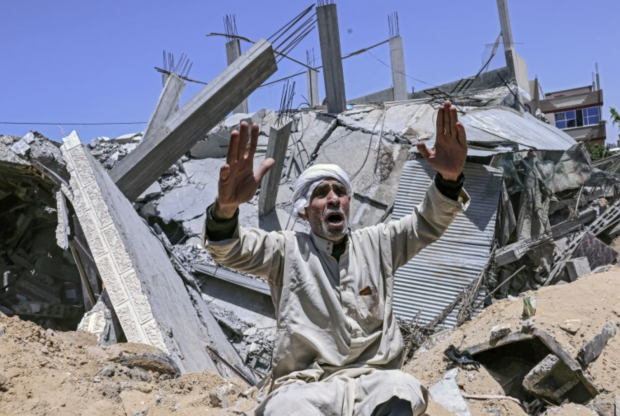
"The Irish government should immediately respect the will of Dáil Éireann and finally recognise the state of Palestine. The government must end its frustration of the Occupied Territories Bill and allow it to be returned to parliament for passage into Irish law. The continuing Nakba in Palestine has to be ended." - Declan Kearney
I vividly recall my friend Ashraf Suliman, the former South African ambassador to Palestine, telling me during a visit to Ramallah on behalf of the Sinn Féin leadership in 2018, that Israel's occupation and human rights abuses against the Palestinian people was far worse than the experience of apartheid in South Africa.
During the last 12 days I have listened to mainly western journalists and commentators, including some here in Ireland, speak about 'escalating tensions between Israelis and Palestinians'.
To analyse what's been happening in Gaza, East Jerusalem and the West Bank of Palestine from that premise is completely misplaced.
There is no equivalence to be drawn between the oppressor and the oppressed.
But there is a choice for the international community to decide which side it takes.
Israel is using a system of apartheid occupation to persecute Palestinians and deny their rights. That was the conclusion of the 'Human Rights Watch' report published on 27 April this year.
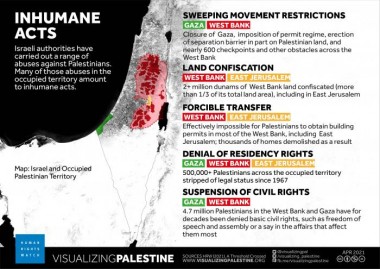
Four months previously in January, 'B'Tselem', a renowned Israeli human rights organisation said:
"A regime which uses laws, practices, and organised violence to cement the supremacy of one group over another is an apartheid regime. Israeli apartheid, which promotes the supremacy of Jews over Palestinians, was not born in one day or of a single speech. It is a process which has gradually grown more institutionalised and explicit..."
Although the main focal point of this phase of greater conflict has shifted to Gaza at this time, many Palestinians have been killed by Israeli forces across the West Bank. Eleven were shot dead on Friday 14 May alone. Summary executions by Israeli military, repressive measures, and mass arrests have been widespread in the West Bank and East Jerusalem.
But now in a new unprecedented scenario, conflict has broken out in towns such as Haifa, Jaffa, and Lod, within the Israeli state borders, where 20% of the population are Arab Palestinians.
Gangs of Zionist extremists have mounted physical and incendiary attacks upon Palestinians in these and other places. The local Palestinians have fought back.
Last Saturday, 15 May, marked the 73rd anniversary of the Nakba, or 'Great Catastrophe', when 700,000 Palestinians were driven from their homes in 1948 by Israel to further expand the boundaries of the new state.
Nakba Day this year overlapped with a present day attempt to evict 70 Palestinian residents from their homes within the Sheikh Jarrah neighbourhood in East Jerusalem, to make way for another illegal Israeli settlement at that site. These families are themselves refugees who were expelled from their original homes during the Nakba.
The reality is that the Nakba has never ended for Palestinians.
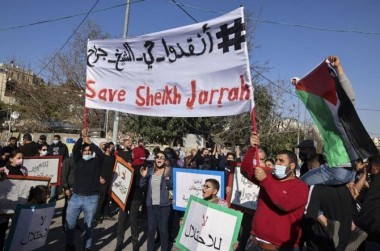
The forced expulsion from their homes and land is not just a historical memory for the Palestinian people, it is an existential, present day experience.
Israeli state sponsored colonisation of Palestinian land, and enforced settlements has been continuously implemented since the 1967 borders were determined.
Currently almost 700,000 Israeli sellers occupy 60% of the Palestinian West Bank, whilst Palestinian residents are being increasingly balkanised into smaller subsets of land within what are described as Areas A, B and C of the West Bank itself. All of these are separated by roads and perimeters controlled by the Israeli military.
In 2020, Benjamin Netanyahu's administration formalised this practice by announcing a newly intensified 'annexation plan' for the rest of the West Bank and East Jerusalem.
All of the existing settlements, the new annexation plans, and the proposed evictions at Sheikh Jarrah are direct violations of the Fourth Geneva Convention, and therefore constitute illegal actions under established international law.
Two years previously the Israeli Knesset adopted the 'Nation State Law' which enshrined Jewish supremacy over Palestinian rights. At the time Arab MPs in the Knesset denounced this law as legalised apartheid.
Following the latest most recent Israeli general election, when 76 out of 120 seats were taken by the right wing and other extremist parties, Netanyahu pledged with others to further strengthen the 'Nation State Law'.
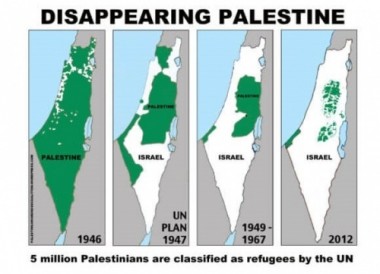
The entire ideological, political and military focus of the Israeli state is geared towards extending its occupation of Palestine and the ethnic cleansing of the Palestinian people.
The extremists within Israeli politics and its military have become emboldened domestically and internationally, due to the support of Donald Trump's US Presidency, and increased radicalisation and ascendancy of Zionist extremists in Israel itself.
In his attempts to hold onto political power Benjamin Netanyahu has become a lightning rod for this extremist realignment, which now has become a catalyst for the waves of violent attacks against Palestinian neighbourhoods within the official Israeli state borders.
During recent weeks, and in the lead into Ramadan, East Jerusalem has been a key flash point, where this extremism has been evidenced with street demonstrations calling for 'death to the Arabs'.
However, a tipping point occurred on 7 May due to the Israeli military incursion at Al Aqsa Mosque, the third most holy site in the Muslim world.
That incident provoked running battles between worshippers and the military, mass protests across the West Bank and in Gaza, and detonated renewed hostilities between Hamas and the Israeli military.
These developments now set the immediate context for what is presently happening across Palestine.
Last Saturday night Sinn Féin organised an online solidarity broadcast with speakers from Gaza, East Jerusalem and the Palestinian diaspora.
All the participants asserted that this new crisis is the culmination of Israeli state policy towards Palestine.
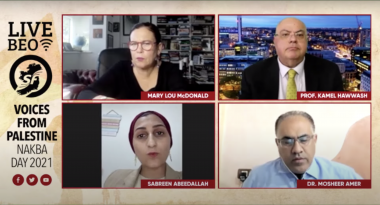
They said clearly that the narrative of a two-sided conflict does not stack up. It is an anti-colonial struggle for Palestinian rights against systematic Israeli aggression.
Israel behaves like a colonial power in the region, and the ideology of the coloniser defines the mindset of the Israeli state towards the Palestinian people.
Peaceful and democratic coexistence with Palestine and a viable Palestinian state is anathema to that thinking.
In the aftermath of signing the Oslo accords in 1993, which made provision for a two-state solution, Israel immediately began to hollow out that agreement by emasculating any potential for an economically and politically viable Palestinian Authority (PA) to emerge.
Since that time Israeli diplomatic, military and political strategy has sought to undermine the PA's capacity to effectively respond to either the occupation of the West Bank, or the siege of Gaza.
As a result, the standing of the PA itself has been weakened and its own authority damaged.
What's happening is straight out of a counter insurgency 'playbook'.
The process of undermining the leadership of the PA is aimed at destroying the will of the Palestinian people to resist, and also deepen political divisions and rivalries among the various political leaderships.
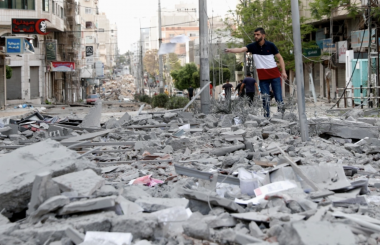
The current military bombardment against Gaza is clearly designed to destroy as much essential infrastructure as possible, and to make Gaza itself uninhabitable.
Just yesterday, 17 May, Israeli missiles destroyed the headquarters of the Palestinian Ministry of Health and Gaza's central laboratory services. At least twelve medical staff were injured, including one doctor, who is now critically ill.
The targeting of missile strikes against tower blocks housing local and international media organisations, such as Al Jazeera, in AlJala' tower is both intentional and political.
Currently over 210 have been killed in Israeli air strikes against Gaza, including more than 60 children. At least 1440 have been injured and, or paralysed.
This new wave of atrocities, combined with the devastation to buildings and public services, is a concerted attempt to destroy the morale and resistance of Gazan Palestinians.
Our world is currently watching the latest terrible chapter of the Palestinians' 73-year-old Nakba unfold on our TV screens.
The repression of the Palestinian people and denial of their rights is an international crime.
It is no longer sustainable.
This time however, Israel actions may have unwittingly had the effect of changing the strategic landscape.
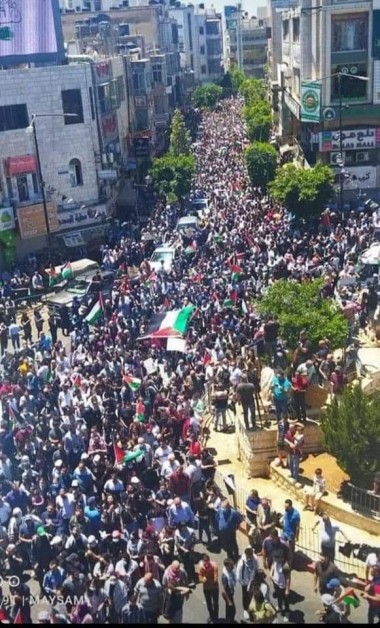
Political resistance by Palestinians against the apartheid occupation is now happening across four fronts; in the West Bank, Gaza, East Jerusalem, and now for the first time in towns within Israeli borders. That is a new development. Today a general strike has taken place across the West Bank.
But for as long as Palestinians remain politically divided, the effectiveness of popular political resistance is reduced.
Only Palestinians can resolve these differences.
The Palestine Liberation Organisation should serve as the authoritive umbrella leadership in Palestine and coalesce all political forces on a coordinated national political strategy.
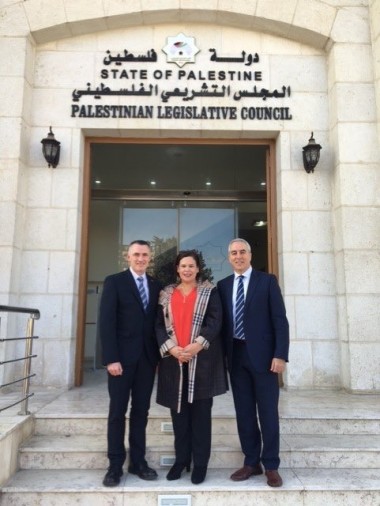
Sinn Féin will continue to maintain open lines of communication with all the main political forces. We, and friends in South Africa and elsewhere, remain ready to support any process to achieve durable national reconciliation, and to encourage the development of internal political unity and cohesion among the political forces.
We in Ireland, and throughout the global community must do more than simply raise our voices in anger and to express solidarity.
We need to make an unambiguous choice in support of the oppressed in Palestine.
The Irish government now holds a seat on the UN Security Council; it also sits on the European Council.
As Irish citizens we must press this Irish government to seek full enforcement of the UN resolutions on Occupied Palestine and East Jerusalem.
Both the UN and EU need to take effective diplomatic action and support economic sanctions against the Israeli state to end the system of apartheid occupation already denounced by among others, 'Human Rights Watch' and 'B'Tselem'.
The Irish government should immediately respect the will of Dáil Éireann (the Irish parliament) and finally recognise the state of Palestine.
The government must end its frustration of the Occupied Territories Bill and allow it to be returned to parliament for passage into Irish law.
The continuing Nakba in Palestine has to be ended.
The internationally recognised national and human rights of Palestinians must be upheld.
Apartheid was wrong in South Africa. Today apartheid is wrong in Palestine.
The international community should reflect on what was required to end that injustice, and act to develop a new, global anti-apartheid campaign.
During my visit to Ramallah in 2018, Ashraf brought me to Nelson Mandela Square to see the statue gifted to the citizens of Ramallah by their brothers and sisters in Johannesburg two years previously.
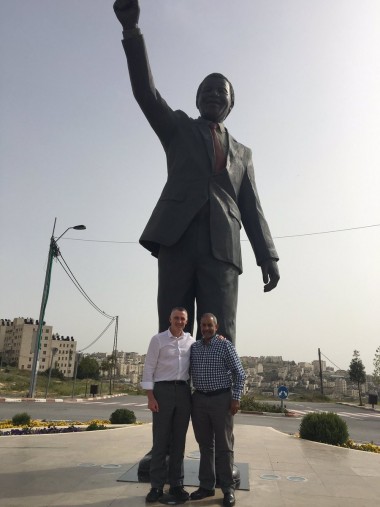
Madiba's immortal words are transcribed on the base of the monument:
"We know too well that our freedom is incomplete without the freedom of the Palestinians".
Amandla!
Tiocfaidh Ár Lá!
Venceremos!
Follow us on Facebook
An Phoblacht on Twitter
Uncomfortable Conversations

An initiative for dialogue
for reconciliation
— — — — — — —
Contributions from key figures in the churches, academia and wider civic society as well as senior republican figures





